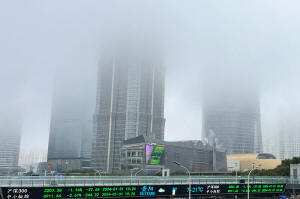World stocks dither as traders temper rate cut bets
 Send a link to a friend
Send a link to a friend
 [February 05, 2024] By
Nell Mackenzie and Ankur Banerjee [February 05, 2024] By
Nell Mackenzie and Ankur Banerjee
LONDON/SINGAPORE (Reuters) -World stocks nudged lower on Monday, pulled
in different directions by a scorching U.S. jobs report that dashed
expectations of a near-term interest rate cut from the U.S. Federal
Reserve, geopolitical tensions and volatile trading in China.
Oil prices swung back to retreat after spiking on news of fresh U.S.
strikes on Iran-aligned factions in Iraq, Syria and Yemen as ample
supply numbers tempered fears about rising tensions in the Middle East
MSCI's broadest index of world shares fell 0.1% while in Europe, Germany
and France's bourses tipped lower 0.1% and 0.2% and London's blue-chip
FTSE rose 0.25% leaving the broader index flat.
"That we are past peak interest rates has generally been seen as a good
thing and corporate earnings overall are hanging in there," said Russ
Mould, investment director at AJ Bell, adding that the real struggle has
been more in small cap stocks.
Normally this would pose as a warning signal for an economic downturn,
but Mould said this was maybe due to a more nuanced picture for these
stocks with liquidity troubles, less sophisticated cash management
functions, research availability and rates sensitivity.
"It's definitely a trend to watch," he added.

Small cap stocks in Asia slumped on Monday as investor sentiment
remained rock-bottom on lack of policy support and broad stimulus for
China.
The S&P China CSI 1000 small cap stock index fell over 6%, closing at a
three-year low.
China's securities regulator vowed to prevent abnormal market
fluctuation on Sunday, but announced no specific measures.
"We need to see a bit more than that," said Rob Carnell, head of
Asia-Pacific research at ING, adding that it was likely that more
piecemeal measures were on the way.
China's blue-chip index closed up about 0.7% on Monday, after dropping
2% earlier in the session and touching a five-year low last week. Hong
Kong's Hang Seng Index finished down about 0.2%
State-backed investors - dubbed the "national team" - have stepped up
buying blue-chip funds to support the market in recent weeks, but so far
have failed to arrest a slump.
[to top of second column] |

A display of stock information is seen in front of buildings in
Lujiazui financial district that are shrouded in fog amid an orange
alert for heavy fog in Shanghai, China January 31, 2024. REUTERS/Xihao
Jiang/File Photo

FED FOCUS
Global markets have been focused on the timing of the first Federal
Reserve rate cut, after a strong slate of economic data along with
resistance from central bankers have led investors to scale back
their rate cut bets.
Markets are currently pricing in an 80% chance of the Fed standing
pat on rates in March, compared with a 33% chance at the start of
the year, the CME FedWatch tool showed. Traders pricing in just
below 120 bps of cuts in total this year, compared with roughly 144
bps last week.
Data on Friday showed U.S. job growth accelerated in January and
wages increased by the most in nearly two years, signs of persistent
strength in the labour market that encourage the Fed to start easing
later rather than sooner.
"I think the Fed could be concerned with the link between sticky
wages and future inflation prints," said Ben Bennett, APAC
investment strategist for Legal and General Investment Management.
"Underlying economic activity has also been robust, so I think the
Fed could be back in wait-and-see mode."
Fed Chairman Jerome Powell said in an interview with CBS news show
"60 Minutes" on Sunday said the U.S. central bank can be "prudent"
in deciding when to cut rates, with a strong economy allowing
central bankers time to build confidence inflation will continue
falling.
The strong payrolls report pushed Treasury yields higher, with the
yield on 10-year Treasury notes at around 4.09%. [US/]
The dollar index, which measures the U.S. currency against six major
rivals, scaled a fresh twelve-week peak of 104.29. [FRX/]
U.S. crude fell 41 cents to $71.87 per barrel and Brent was at
$77.02, down 31 cents for the day as surplus supply and weak demand
outweighed escalating geopolitical tension in the Middle East.
(Reporting by Nell Mackenzie and Ankur Banerjee; Editing by Dhara
Ranasinghe and Toby Chopra)
[© 2024 Thomson Reuters. All rights
reserved.]
This material may not be published,
broadcast, rewritten or redistributed.
Thompson Reuters is solely responsible for this content.
 |